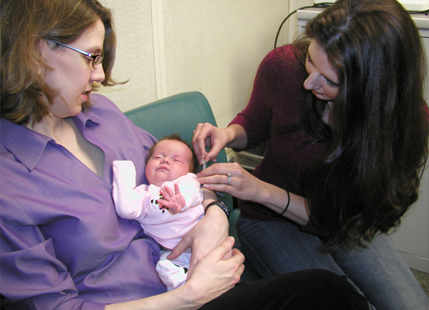Training Pediatric Audiologists to Alleviate Shortage
by Joel Schwarz

Audiology graduate student Katie Borgmann, right, fits Zaphia
Snow with a tiny hearing aid as her mother Laura watches.
Borgmann is in the first wave of students receiving specialized
training at CHDD to help alleviatea shortage of pediatric
audiologists in Washington.
Washington has a critical need for more specialists in pediatric audiology because of the advent of universal screening for hearing loss among the approximate 85,000 babies born in the state every year. An estimated 255 of these babies are diagnosed with permanent hearing loss annually. To help address this shortage, with newly acquired federal funding, the Clinical Training Unit (CTU) based at the Center on Human Development and Disability (CHDD) has initiated a new project.
Screening is typically done before an infant is sent home in the hospital well-baby nursery or in the neonatal intensive care unit by a nurse and the testing is pass-fail, according to Lisa Mancl, M.S., lead audiologist at CHDD and clinical instructor in the University of Washington’s Department of Speech and Hearing Sciences. Babies that fail the test are referred to an audiologist, but there is a shortage of pediatric audiologists to work with these children and their families. “Schools have not been putting out enough audiologists, especially pediatric audiologists, and there is a large demand for services because we are finding a lot more infants with hearing problems since the state began universal newborn screening in 2003.”
“Just a limited number of audiology training programs in the United States provide a specialization in pediatrics,” said Richard Folsom, Ph.D., who leads the new project. Folsom is the audiology discipline leader in the CTU, the chair of the Department of Speech and Hearing Sciences, and a CHDD Research Affiliate. “A number of audiology training programs are not focused on pediatrics, but we are and the UW has had a long tradition of pediatric audiology. There seem to be three areas that audiologists go into: adult audiology, private practice selling and teaching people how to use hearing aids, and generalists who include pediatrics in their work. This project is designed not only to give students training in pediatric audiology but also to train leaders who understand and support family-centered care.”
A key focus in training will be teaching students how to counsel families and provide them with emotional support in dealing with the news that their baby has a hearing loss. “We’ve heard from families about their experiences when told their baby has a hearing problem. Overall, they say audiologists lack sensitivity to the situation,” Folsom said.
Third-year audiology graduate students Katie Borgmann, Lindsey Melvin, and Stephanie Giaquinto were selected last fall as the first cohort to be trained under the project. During their first two years they completed the regular UW audiology training curriculum. Then, starting last fall, under the new project their third-year program includes being part of an interdisciplinary team with psychologists and audiologists working closely with young children and their families. The students also will follow a family to understand the wide range of experiences a child with a hearing loss is exposed to. This training includes counseling so-called “standardized patients,” or actors trained to be patients.
“We borrowed the idea of using standardized patients from the UW Medical School,” said Mancl. “It is up to the students to react to the actors just as they would with real patients. The students do a counseling session that we videotape. Then they watch themselves along with other students and are critiqued.”
“This is an incredibly powerful teaching tool,” added Folsom, who noted that the students also will have training sessions with real patients and families. The students’ fourth year of training will be a full-time experience in a pediatrics center. This training also includes such things as working with families after a hearing loss diagnosis and assisting them in how to use hearing aids and how to work with their child to communicate. “The students involved in this program will get above and beyond normal training with a strong pediatrics focus,” he said.
In addition, the project involves measures to gage how well the students perform before and after completing this specialized instruction. Ultimately, the project will train up to a dozen people with a strong emphasis on pediatric audiology. While 12 new specialists can’t solve the critical shortage of pediatric audiologists, the project has been designed to create a leadership cadre to improve the field’s service to children and their families. “Our goal is to educate leaders who will train others in providing exemplary pediatric care,” said Mancl. “This program will give them the specialized training that they can use in a leadership role.”
|